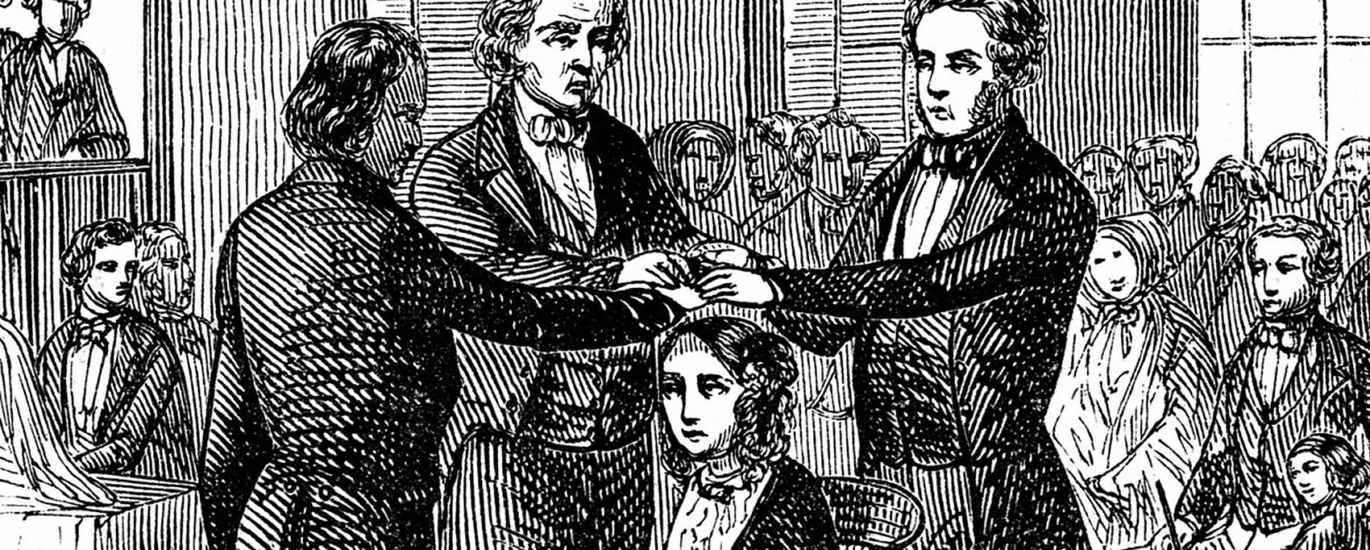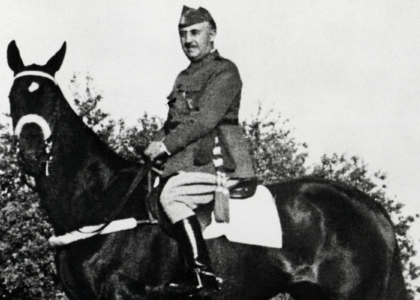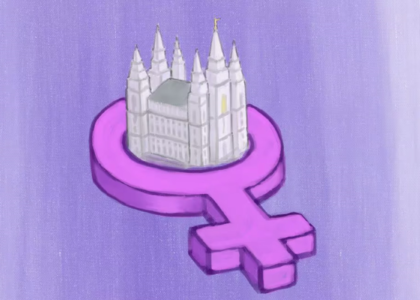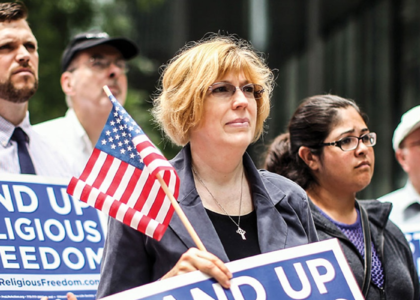“I am everything Mormonism wanted me to be and I am not my own”
When we began accepting submissions for this season, we received an outpouring of stories from women in the Church of Jesus Christ of Latter-Day Saints. Stories about how the Church has affected their relationships, how it’s affected their careers, their faith, their sense of self-worth. And, while we are very much dedicated to continuing to seek out and promote diverse voices, we also believe that this surge of stories from Mormon women needs to be heard.
We received so many of these submissions that to listen to them all at once would be overwhelming, so we’ve decided to split them up to make sure we can pay adequate attention to each individual experience. In this episode we hear several short, personal stories from women raised in Mormon homes, and we’ll return and hear more of these stories later in the season. We’re so grateful for each and every one of these contributors for finding the courage to speak and the wisdom to recognize that we all deserve better than the patriarchy we were raised under.
To begin this series we’ll be hearing from three guests: Tiffany Sowby, Chelsea Homer, and an Anonymous Contributor.
Our Guests
Tiffany Sowby
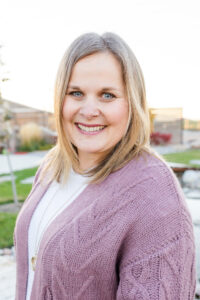
Tiffany Sowby (she/her) is the co-host of The Sisterhood Podcast. A few of her favorite things are: Scrabble games, meaningful conversations, and shopping for shoes. She has an unhealthy dependency on Nutella.
.
Chelsea Homer (she/her) is the founder of Faith Journey Meetups and co-founder of a social club for women and genderqueer people looking for connection outside of religion. She loves to write, hike, and go on bike rides with her family.
Chelsea Homer

PART ONE.
Tiffany Sowby
Not too long ago while on a family vacation, I was reading a non-fiction book about the experiences of minority women in prisons. Reading the cover of the book, my dad questioned, “When exactly did you get turned on to the plight of women?” I didn’t have an answer for him. I cannot think of a time I didn’t care. From a very young age, I can remember specific examples of noticing disparity and significant unfairness among women—most of whom, at the time, were friends of my mother. As a child, I spent a lot of my time watching people around me. Specifically, the women that tended to be friends of our family. I wanted to know more about them and their lives.
As a child, there was little information given to me except for what I could glean from observation, overhear from eavesdropping, or simply make up in my assumptive childhood mind. I was fascinated with Helen; I wondered about her continual state of poverty and wished I could meet her alcoholic husband. When Linda, a single mother became pregnant with a second child, I was told it was none of my business when I asked who the father was. I wanted to know why Barbara, whom I dearly loved, was suddenly in turmoil, and her husband suddenly gone from her life.
While a lot of the questions I had for the adults in my life growing up went unanswered (and often unasked), it didn’t stop me from trying to learn. I remember distinctly a conversation when I was 7 years-old, in the back garden of a London suburb home. Though I can’t recall the questions I asked, I remember the exasperated answer, “You ask so many bloody questions, don’t you?” Despite feeling chastised at the time, this conversation was a defining moment in my life. My ability and courage to ask questions, especially difficult questions was there to stay, and in the years since my questioning has continued to open up new paths, opportunities, and relationships.
One of the most pressing questions of my adult life, however, has occurred as a member of The Church of Jesus Christ of Latter-Day Saints; a noticeably patriarchal faith and practice. It is the question, Where are the women?

Let’s back up a bit first though. In 2017, I was asked to be the president of the women’s organization of my local church. Although overwhelmed by the responsibility and magnitude of the position, I accepted knowing I could be a key player in the lives of the 170+ women for whom I was responsible. One of my responsibilities was to attend a meeting twice a month, in which two other women and I met with 10-12 men to discuss the needs and logistics of the entire church congregation. I do not think I attended a single one of these meetings without subconsciously counting the men versus women in the room. Of course, I didn’t allow this unfair ratio to prevent me from asking questions, speaking up, and challenging status quos. The other two women were never as bold as I was, and I am quite positive the glaring ratio disparity helped me recognize the vital need of my female voice amid the sea of male voices. Especially as women made up (at least) 50% of the congregation.
There were many times I found the courage to speak up when tradition suggested I keep quiet. There is a lot of unspoken tradition within my church and certainly in those meetings which allow the male leaders to take the lead and make most of the decisions, but I had to dare speak. If I didn’t…who would? Many times, I left meetings frustrated and saddened by gender disparity. And, unfortunately, there were a handful of times when men tried to silence me, whether through humor or a snarky comment, but I always returned determined. Although many of the women I served with in leadership capacities were perhaps not as bold, as I said, I felt their support silently and sometimes loudly cheering me on. I knew if I wanted to see change, or I wanted the voiceless to have a voice, in that congregation, at that time, I was going to have to take action.
I do not think I attended a single one of these meetings without subconsciously counting the men versus women in the room.
Fortunately, the male leader I worked most closely with listened to my thoughts and feelings, whether I shared them in long one-on-one conversations, or in long (sometimes ranting) emails. I spent many hours sitting across from this man helping him understand that these changes were not just for me. They were for his wife, his daughters, his sisters, and for every single woman. I can’t say this man agreed with everything I said or suggested, but he trusted me to lead, and frequently asked for my suggestions and my opinion, sometimes even in that unequal meeting, in front of other men. That was empowering. I like to think other male leaders in that room observed that dynamic, and hopefully learned from it. Anyone that has ever been involved in advocacy work knows that sometimes it can feel lonely, frustrating, discouraging, and never-ending. Learning from other allies helps one feel empowered to keep speaking up and speaking out. I knew I wasn’t just doing this work for me; I was doing it for every woman throughout the Church who are all too frequently are under-valued and under-used.
During this time, as I served among the top leadership of the congregation, I couldn’t let go of my nagging question, “What about the women?” I cared about the women. I always have, and I know I always will. One Sunday, I was feeling extremely frustrated and disappointed when I attended a large church gathering that had a lot of local church leaders present and of course I saw very few women. I repeatedly and respectfully over the following few months asked, “Where are the women leaders?” Within my church, progressive changes for women lie entirely with the male leadership. So, I specifically nudged my male leader to go to his male leader and ask the same questions I was asking.
In all honesty, it took a fair amount of nudging. Conversations regarding gender—and certainly the word ‘feminism’—are not widely accepted and smiled upon in many of my faith’s congregations, and I am sure this leader of mine had his own hesitations in being given a particular label or judgement. However, a year later, in a similar meeting to the one I previously felt frustrated and disappointed with, I noticed a third of the leadership seated in front of the large gathering were women! I sat in that meeting and cried tears of joy! A couple of close friends aware of my questions, sent me texts recognizing my efforts, and I of course I sent a text to my male leader thanking him for having the courage to act as an ally.
In the time since this victory Covid has changed many of the leadership displays in my church, so I am not sure how permanent these improvements will be. But what I do know is that asking my questions had made a difference. Was it easy? No. Did it take courage? Absolutely! I often found that courage in a favorite quote by Ruth Bader Ginsburg, “Speak your mind, even if your voice shakes.” Seeing those changes gave me the hope I needed to continue advocating for women at church. At the end of my two-and-a-half-year assignment, I was proud and humbled at a comment made in a public setting by a male superior: “Tiffany Sowby gives a damn about every woman.”
Although I am no longer in a leadership position, I have not and will not give up advocating for those who do not have the courage, privilege, or position to do so themselves. We must speak up. We must speak out. The key to it can be found in another quote from Ruth Bader Ginsburg, who urged us:
“Fight for the things you care about but do it in a way that will lead others to join you.”
PART TWO.
Anonymous
Think about all the things your mom sacrificed to raise you. Now imagine a situation where she was able to accomplish all of those things, in addition to raising you; how would her life be different?
I was raised in a family that did their best to practice the teachings of the Church of Jesus Christ of Latter-Day Saints. Part of those teachings state that a father’s role is to preside, provide, and protect and that a mother’s role is to nurture her family. Parents should only change roles if circumstances require it.
In my family, I think it’s safe to say that we struggled financially. Because my parents believed they would be blessed if they held to roles they felt God had given them, my mom never got a “job” outside the home. The Church has a strong welfare program that kept our family afloat through some of the financially dark periods growing up. That being said, my mom really had to make money stretch to get us all clothed, get furniture and organizing systems, and other things many of us take for granted. One thing that always stands out in my mind is that we were always running out of scotch tape, and I would ask if we could get some more, and my mom would say that we wouldn’t be able to until next month when the budget reset. I also printed out a lot of my school assignments into the back side of used paper, because we often didn’t have new printer paper in the house. Picking up and fingering a blank sheet of printer paper still feels like a luxury to me. I wore hand me down clothes from some neighbor girls. Once they stopped growing and giving me clothes, I got by on a few items because I didn’t want to stress my parents out more than they already were. They would have helped me get clothes if I had asked, but I was trying to be helpful. Anyway, all of that to say, we never had food insecurity and we had a really rich life, including having my mom at home and being homeschooled, but there were areas where it would have been a whole lot easier to function if we’d had a little more money.

Back to my mom. She sacrificed a lot between homeschooling seven kids, making every single meal from scratch to make money stretch, and being anxious about whether we’d have enough gas money to get to where we needed to go. There was a time period when she was worried about getting foreclosed on. During these years my parents were really stressed out, their marriage was stressed, my siblings fought a lot, like kids do, and as a result of all that I was fairly stressed out about my family and our financial situation.
One time when I was a tween, I remember my mom was able to earn a few hundred dollars through a small conference she put on for homeschool moms who were into natural living. I remember witnessing her joy at having some discretionary money for the first time in years. She hadn’t gotten clothes for years, probably not even second hand. There were probably a million things she wished she could buy to make the house more put together, organized, and/or decorated, or to make the kitchen more functional, after scraping by for years. It was just really exciting for her to have some spending money after not getting anything but the bare necessities for years. But, finances were really tight, and my dad felt that this money my mom had should go to cover the bills. This makes sense from a partnership perspective. However, my parents both believed that they would be blessed for living out gendered financial roles, including my mom not having a full time job. The difficulty was, because of their gendered roles, my mom couldn’t really do anything to change the overall financial situation of the family. So at this point, if she put this money she had earned toward paying the bills, that would mean that she would be in a situation where she could either do nothing and have no spending money, or hustle in the little free time she had and still have no spending money.
My parents also believed that they would be blessed if they followed the teachings of the church that taught that the way for a man to be a good person is to lead and the way for a woman to be a good person is to follow. So it was It was my dad’s job to make the final decisions about his career. Given all of this, my mom used some of the money to pay the bills, but used the rest of it to pay for me and my siblings to go to a youth conference that we really wanted to go to, that a lot of our friends were going to, and that she really wanted us to go to as well.
And, because my mom did believe that it was my dad’s responsibility to provide for the family, from then on, when she made her own money she kept it to her discretion, asking that he cover the bills. That meant that she was able to have some breathing room in her budget, much of which she used to get nice things and educational experiences for us, the kids. But overall, our finances still struggled.
My parents did eventually come out of this experience with a partnership marriage where they make decisions together. And with my mom’s support, my dad eventually got higher paying work. So the beginning of the story is not the same as the present day. However, going through the beginning of this experience as a teenager, I came out of it determined that I always wanted to have agency over my financial situation from the beginning of motherhood to the end of it. Yet at the same time, I still believed that it would be totally wrong to be a working mom. I definitely had what Dr. Julie Hanks calls aspirational shame. I also believed that I was morally obligated to get married and have kids as quickly as possible. I hadn’t really figured out how I was going to do all of this, or even how tricky this could be.
Before I move on from my childhood, I just want to say that I don’t hold any of this against my parents. I just wish that things could have been easier for them. And I feel like the patriarchal culture that was handed down to them made the situation more difficult than it would have been if they had been given a partnership culture from their parents, from their religion, and from their society.
When I went to college, I studied software engineering. Because I was afraid of financial difficulty, I basically picked the major with the highest job security. Right after I graduated, I got married, and I got pregnant right after that. Once I was pregnant, I realized that if I had gotten married before graduating, I would have felt compelled to have a baby, and I don’t know if I would have graduated. That thought was a little bit terrifying to think: that I could have gone into parenthood without the financial security of a college degree. And at that point I realized that many women do enter motherhood without financial security. This was a really sobering moment for me. I felt really sad and frustrated that I had never been told that I might not finish my college degree if I got married and had a baby before I finished it. When I heard the Breaking Down Patriarchy episode with Maxine Hanks and she talked about how she and her friends came of age in the 70’s and got to choose what their careers were going to have, because of the feminists who came before them, I was floored. I feel like I have been reinventing the feminist wheel since I left my parents’ house, even though women have already done this time and time again before me.
Before I leave my college years and move to talking about my career and motherhood, I want to stop and add a little blip about homophobia. I realized as a teenager that I am sexually attracted to women. It was actually when reading a blog post by Josh Weed, who is a gay man who was in a straight marriage in my church. He told this story about how someone asked him something like, “So if you went into a room of naked women you wouldn’t feel anything?” And when I read that, I was like, “Ummm. If I walked into a room of naked women I would definitely not NOT feel something.” But I told myself that I was only sexually and not romantically attracted to women. However, when I was in college I started becoming friends with this really cool girl. She felt like she had stepped out of Anne of Green Gables; she was energetic, and excited and fairy-like. And she was also a web designer, but she said that she liked the math and logic side more than the design side, and so I was going to try to convince her to switch her major to computer science. Then one day, and this was maybe the third time total that I talked to her, I caught myself fantasizing about living a whole life with her and felt jealous for her attention in a romantic, monogamous way. It was that butterflies in your stomach, clenched chest, lightheaded, oh-so-anxious-to-know-what-they-think-about-you-feeling that I had felt so many times about boys in my life. Up until this experience I hadn’t even really realized so much of the anatomy of that feeling. All of that fantasizing happened in a lightning second before I realized what was happening and shut it down in horror. I quickly got out of that conversation and avoided seeing or talking to that girl from then on. I felt self-loathing and deep shame for that part of myself. I have a really analytical brain and so I would ruminate on the REASON dating a girl would be wrong. I reasoned to myself that I could never live that way because I wouldn’t be able to have babies, and so it would be selfish. Anyway, I do wish I had been able to live fully as myself my whole life. I feel like I don’t really have anything meaningful more to say about this though. I guess one more thing I want to say is that heteronormativity kept me from having meaningful friendships with men or boys my whole life, and I do hate that.
Anyways, back to me graduating from college and starting my career. I started working as a software engineer after college, and my husband started working in the same position at the same company at the same time. This was April of 2018. I was pregnant at the time, and I planned on only working until I had the baby. But as time went on, I started daydreaming about how much financial freedom we would have if I kept working, and I was also nervous about being financially dependent on my husband. At the same time, I felt deathly guilty about working after having the baby. Eventually I found a solution; I would ask my managers if I could work 20 hours a week. If they agreed, I would get my dream of remaining independent. If they didn’t, I would still have my degree to fall back on and I would have the privilege of staying home. It took all my guts to ask my managers, but they said I could try it for six months and then they would reevaluate. I was breathlessly excited.
I still believed that it would be totally wrong to be a working mom.
That September, my son Clark was born and I went on maternity leave until January. When I came back, my husband had gotten his annual raise, and I had somehow been overlooked while on maternity leave. This wasn’t something that was supposed to happen at that company, but on the other hand, they didn’t have any auditing system to check whether it or other gender inequities happened. I didn’t bring this up to anyone because I felt lucky that they let me work 20 hours a week. But eventually I mentioned it to my manager. He was actually a member of my church and he was a local leader, and I really looked up to him and thought “He’s a really good person. If anybody in this company is going to understand this problem or that I need help, he will.” And I was really surprised that when I brought it up to him he dismissed it out of hand, and he did it in a really soft and gentle voice and tone. That was the first time I realized that being nice doesn’t always mean being right or doing the right thing. I finally brought it up to HR after I realized that this problem wasn’t just mine, but all women and birthing peoples. Once I realized that, I realized that, I asked myself why I, on my own, wasn’t also worthy of fair treatment, as I believe women as a whole are. So, a few years after it happened, I brought it up with HR and they gave me a mid-year increase. But if I hadn’t brought it up, my husband would have continued to make exponentially more than me for the rest of our careers, as each raise is a percentage and builds on the previous one. That means that two people in precisely the same circumstances, except for their genders, would end up with a big wage gap. We had the same degree from the same school. We worked at the same company. We started on the same day. We even both had a baby on the same date. The only difference between us was our gender.
Now rewind back to my life right after my first son was born and I was going back to work 20 hours a week. I was able to pay a nanny to watch him while I got out of the house to work. I was also able to pay for three ballet classes a week for myself, which was something I felt like we wouldn’t have been able to pay for if I wasn’t working, and was something I had desperately wanted to do but hadn’t had the money to do as a teenager. At this point, I felt like I had control of my destiny and could reach my dreams. And I hadn’t ever realized as a kid that that’s not how it is for many moms, after keeping up with the house and kids and/or also making ends meet.
Motherhood all seemed so purely hunky-dory when I was a kid. And again, I felt sad and frustrated that I had never been warned about how difficult it can be to maintain personal growth and agency over one’s life as a mom.
Fast forward a couple years to find me working 40 hours a week from home, without any childcare. Fast forward again, and you’ll find me burnt out from working and being a mom to now two children. Fortunately, at this point I had a lot of money saved up, and felt more secure with my husband, so decided I wanted to be a stay-at-home mom. My husband and I went through all of our spreadsheets of finances and figured out how things would go, and I quit my job. I felt conflicted making that decision. On the one hand, I wanted to keep the agency that having an income gave me. On the other hand, I wanted to get “paid” for the work that I was already doing as a mom, instead of expecting myself to do more than any person should do.
I am going to get into how this played out more, but in order to do that, I also need to talk about the postpartum depression that I had after the birth of my second son and after quitting work. To start talking about postpartum depression, I would like to go back to what I was told about babies as a kid. I was told that my greatest purpose in life was to have babies. I was also told that my greatest happiness in life was to have babies. My mom and most of my aunts had a lot of babies, and in my extended family it felt like babies were the best thing ever. In my immediate family, I am the second out of seven, and every time a younger sibling arrived, I felt like it was better than any Christmas, birthday, or trip to Disneyland, because a whole new person had come into the world. And every person is sacred. Also, I loved, loved, loved taking care of and playing with my baby siblings. Given all of this, I was super excited to have babies. I was chomping at the bit to have babies basically my whole life.
When I finally brought my first baby home from the hospital, we had the dreamy babymoon period that some people hope for. I was on maternity leave, and I would sit in my stuffed rocking chair with my newborn on a nursing pillow. He would eat and sleep while I worked on passion projects on my computer. We would go for walks when I wanted to get outside. It was heavenly.
As he got older, he became extremely grouchy for several months. The only way to get him to stop crying was to take him on walks or car rides. This made me feel like tearing my hair out and screaming, but I made it to the other side, and hoped that my next baby would be happier with an older sibling to watch.
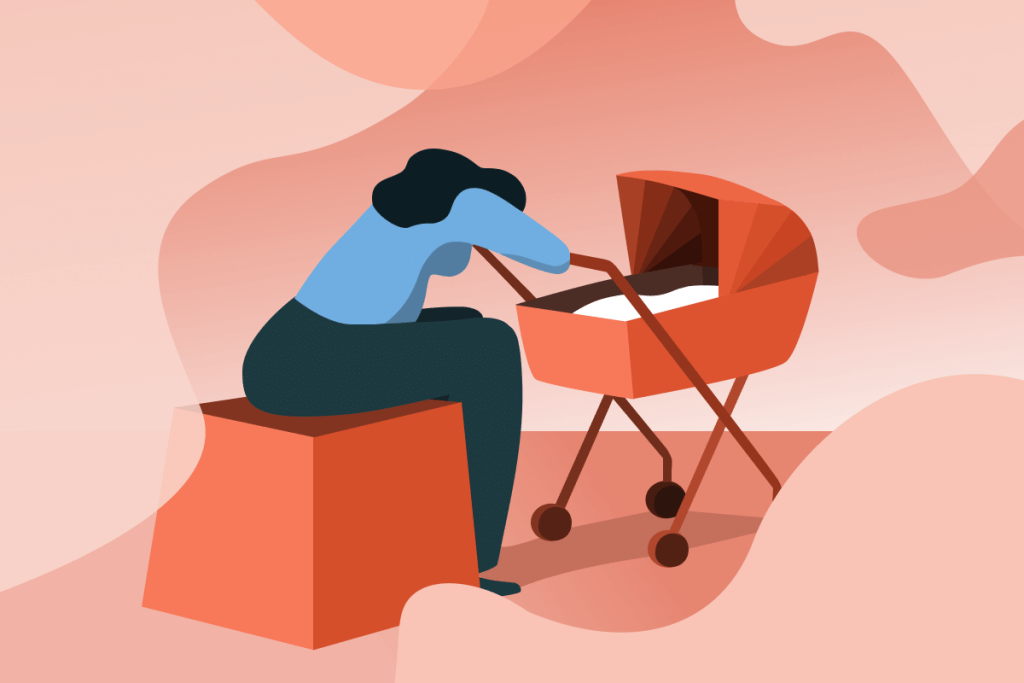
Well, skip ahead to my second baby, born December 2020. I brought him home from the hospital and he wouldn’t sleep for more than three minutes unless I slept next to him. While he was awake, he would cry unless I bounced him in a bouncer with my foot. I figured out that he would sleep in the bouncer as well, as long as I kept bouncing him. So he ended up mostly living in the bouncer for a couple months. The feeling of being tied to a helpless human who will scream relentlessly if you walk away from them really messed with my brain. I felt trapped and like I had lost my autonomy. All I wanted was to organize a closet or go to the store, but I was tied to this little person who needed me. I tried wearing him in a wrap against my body so that my hands would be free, but it was always extremely hot and sweaty and uncomfortable, and I felt like my range of motion was severely limited. With the extra weight on my chest, it was a real chore to bend over to unload the dishwasher or do the laundry or pick up toys, and it was hard to do the dishes with the big bulge of my child’s head interrupting my line of sight to my hands in the sink.
I don’t remember all the details from this period. Eventually I found a rocking bassinet that my baby would sleep in for one or two hours at a time. But even with that, I felt like I was drowning. I fantasized about running away all the time. I wrote a journal entry in April, four months after the baby was born in December, that said that I had fantasies about cutting myself on several different occasions. When these happened, they would last for a few days before I felt better and was able to keep things light for a few weeks until they happened again. This was really shocking to me each time it happened. I had been through some dark periods as a teenager and in college, but I had never ever ever thought about cutting myself.
During this time, I listened to the Breaking Down Patriarchy episode on The Awakening by Kate Chopin. In that story, Kate Chopin talks about this woman who had just had a baby, and the woman walks into the ocean and keeps walking until she drowns. And when I listened to that I felt so represented. That’s exactly how I felt. The character also talked about how she felt torn between desperately needing her autonomy and her innocent babies needing her. And that, of course, was exactly how I was feeling. I also found an article from TIME Magazine by Gayle Forman, author of a book about a mom who runs away. And she talks about how every single mother she talked to said that they fantasize about that, and not a single father she talked to said that. After reading this script of what I am telling you today, my husband said that it made him realize that being a mom is like being the on-call person at his work, who is in charge of resolving issues if something goes wrong with their website outside of business hours. Except that as a mom you don’t just do it for a week at a time, as a mom you do it 24/7, 365 days a year. And he said, “Being on call is the worst because you can’t have a life when you’re on call, even if you don’t actually get called that much, you can never rest easy or commit to other things.” And he also said that the emotional labor of caring for children for 8 hours is usually much more exhausting than the effort extended at a desk job.
Anyways, after these dark feelings kept coming back over and over and over again and did not go away like I hoped they would, I got therapy and opened up to my husband about it. Part of what took me so very long to do anything about something so serious, was that I didn’t want to seem like I was just trying to get attention or being overdramatic. I kept second guessing whether I actually felt that way, or whether I was just being selfish and weak. Both my therapist and my husband encouraged me to get more alone time while my husband watched the kids. My therapist also helped me make my goals for what to do in a week a lot smaller and helped me be kinder to myself overall.
Around this time was also when I heard another Breaking Down Patriarchy episode, this time on The Real Wealth of Nations by Riane Eisler with Dr. Julie Hanks. In this episode Dr. Julie Hanks talked about how our society doesn’t value care, even though it is the foundation of society. I was blown away. I realized that since having this baby and spending all my time on care tasks and quitting my job, I had felt worthless as a human, since I felt like I wasn’t doing anything of worth. But if care was indeed a work of worth, which it is, then I could feel good about myself again. I still had self-harm fantasies after this though. It wasn’t the whole answer.
A couple of times last month, October 2020, these feelings caught up to me again. I still took a really long time to tell my husband about it, because, still, telling him about it feels like I am being selfish. Like I’m using my emotions to get more help from him when he is already doing so much. I feel spoiled when I have plenty of money, some free time, a nice house and food on the table, quite literally because my husband does the cooking. I know there are patriarchal roots behind feeling like I can’t talk about it. I have always been taught to give, give, give, and to never think of myself.
Another thing I wanted to talk about on this subject was that, during the first few months with baby Howard (that’s child number two), I so desperately wished that I had a career that I loved and could pay for childcare while I got out of the house. But after listening to Breaking Down Patriarchy, I have realized that my dilemma between being a working mom with autonomy and being a stay-at-home mom without autonomy, is a dilemma created by patriarchy.
…since having this baby and spending all my time on care tasks….I had felt worthless as a human, since I felt like I wasn’t doing anything of worth
I felt so vulnerable in those months. I hated being completely dependent because of my child. But the idea of independence is sort of a myth of Dominator culture. Nobody is actually independent. We all rely on millions of people to function. And if there are positions in society that we would hate to occupy, then there is something wrong with society. All of that is to say that there was nothing wrong with me, as a drowning mom, but that there is something wrong with society, both in how it makes mothers financially vulnerable, and in that moms and babies are not taken care of mentally or socially. It hasn’t always been this way and it doesn’t have to be this way, as we learned in Season 1’s episode on The Chalice and the Blade.
And with everything I’ve said today, this is what it has helped me understand: society needs children in order to persist, but in our patriarchal system, not only is the brunt of that labor is dropped onto women, but it is then devalued and under-supported. In addition, the potential and gifts of women should be welcomed out of the home to benefit all. All of that being said, let us create a world where society is built, not by sacrificing mothers, but by empowering them.
PART THREE.
Chelsea Homer
A few months ago I texted my hairstylist to schedule an appointment. She had a last-minute opening and could squeeze me in that week. “What do you want?” She asked.
“I want it all off.”
Several days later, 17 inches of long, worn hair lay wadded on the ground of my stylist’s garage apartment studio. Years of growth, gone in a few snips.
There’s a saying that hair holds memories. For me it was less about holding memories, and more about looking less like the memories I no longer wanted in my life.
Prior to the big cut, I was talking to my therapist in an online Zoom session. “I look at myself and am triggered.” I told them. “I am so Mormon. My sense of humor. My vocabulary. The way I dress and interact with the world. It’s in my DNA. I am everything Mormonism wanted me to be and I am not my own.”
I am one of thousands of people making the incredibly difficult decision to part ways with the LDS Church. This distancing has involved cutting myself loose from both religious rituals and a spiritual language that I, and so many others, have literally pledged our lives to. Leaving this demanding religion has resulted in a profound loss of community, belonging, and emotional intimacy. It has affected so many relationships that are important to me. The loss has been all-consuming. And, as I’ve been sifting through the broken pieces, there is an added pain as I realize how little I actually had to begin with.
For me, the deepest wound and largest catalyst in this life-altering is the patriarchy. In her book Untamed, Glennon Doyle writes, “The God memos we get as kids are carved into our hearts. They are hard as hell to buff out.” And the God memos I received as a kid in the LDS Church came from a highly concentrated patriarchal lens.
If you do a google image search for “Mormon leadership”, you’ll see rows and rows and rows of images of predominantly white men in dark suits. This tangible display of patriarchy certainly isn’t discrete, and it is absolutely intentional. As members, and especially as female members, we’re taught to be proud of and to look up to our “divinely inspired patriarchy.” It didn’t take long for me to understand that the currency for leadership opportunities and power within the Mormon church is the priesthood. As a woman, that was something I could never, ever receive. Rather, growing up I was told my divine power came in the form of an organ—my womb.
In the LDS Church, men are the local and general leaders. They are “Judges in Israel.” All church-wide decisions, policies, and revelations come through men. If God (a man) wants us to know something, he will reveal it to another man. Men are ultimately the ones responsible for recording and crafting the spiritual language so many of us will have imprinted on our minds and hearts forever.
I remember an especially traumatic experience I had in the LDS temple. This was shortly after my husband had left the Church, and I was still desperately clinging to my beliefs and trying to figure out how we would make this work. That day in the temple, a place where only faithful, worthy, tithe-paying members are allowed to enter. I’d been told over and over that there’s no place on earth I could be closer to God than in the temple. At one point in the ordinance the men in the room covenant to obey God, where at the same time the women in the room are asked to covenant to hearken to harken unto their husbands. My heart started racing. I was furious. I had heard this verbiage repeated here in the temple so many times before, but this time it felt barbed and personal. Here I am, desperately trying to connect with the divine… and I’m being told that Nick, my then atheist husband, was to be my intermediary with God. Years and years of bottled-up rage came spilling out as I left the session.
How could God distrust me so much?

The loss has been all-consuming. And, as I’ve been sifting through the broken pieces, there is an added pain as I realize how little I actually had to begin with.
Interestingly, in 2019 that particular line in the temple language to allow women to covenant to hearken to God and not their husbands was changed. I still wonder how many women were harmed by that line and so many others in the process.
It’s hard to know how the patriarchy impacts society outside of organized religion. I grew up swimming in it—no questions asked. It was all I knew. And it was not only good, but of God. For me, questioning the patriarchy felt synonymous with questioning God.
A few years ago, the time came to bless our newborn son, Will, in front of our local congregation. This is typically done by the father of the child, but seeing that Nick was no longer eligible, the responsibility would fall on another priesthood-bearing relative. Rather than having my dad give the blessing, like we did with our daughter, I wanted to bless Will myself. I knew his little body and soul so well, and it hurt that any random priesthood holder would take precedence over me because of their gender. My exhausted and fed-up self took to Instagram and let this wound bleed publicly for thousands to witness. I wanted more. Why was this so painful? In the post, I asked for ideas for ways that I could take part in this deeply patriarchal ritual. I was tired of outsourcing my power.
The most shocking part of posting this vulnerable plea was the backlash I received…not from men, but women. Friends of mine. Women I had known for years. Women I cared about, served with, and loved. It hit me….it wasn’t only the men upholding these deeply patriarchal systems…it was the women. I was told that if I understood God’s plan, I wouldn’t feel this pain. My wound was made to feel small and easily dismissed. How could the people who would have had the most opportunity to feel this unique pain be among the most staunch upholders of the patriarchy?
This cut me deep.
In 2019, Jana Riess, a popular author and columnist in the Mormon community, wrote an article introducing the idea that we, as members of the church, are not training our kids to listen to or respect our women like we do for our men. This absolutely rang true for me. How could I listen to and respect other women, when I don’t even listen to and respect myself? I didn’t believe my pain. I didn’t feel qualified to lead or be listened to. Any hurt I felt around “wanting of more” had been hushed and prayed away for my entire lifetime.
Ultimately my decision to leave the church came down to being tired of gaslighting myself; gaslighting myself in the chapel, gaslighting myself while helping with the young women’s organization, and gaslighting myself in ward council meetings with the bishop. The thought of bringing my beautiful baby girl AND boy to a place of worship that is coated with this level of inequality hurt me. It hurt Nick. Neither one of us left the Church unscathed.
Since leaving, I’ve started a support group that is now almost 6,000 members strong. It’s a place for marginalized genders (women, trans women and nonbinary friends) looking for support. Thousands of stories later, it’s clear that the wound of patriarchy, specifically the Mormon brand of patriarchy, is one that has deeply impacted so many of us. It’s informed the way we think about our bodies, our voices, our skills and hobbies, our sex life, our views on gender roles and work outside the home. It’s significantly impacted our tolerance for abuse. Untangling ourselves from harmful messages around our femininity will be something many of us wrestle with our entire lives.
It’s been two months since the haircut and my daughter still comments about my “reeeeally short hair.” At first, her comments stemmed from shock, but now I sense her curiosity. Maybe one day she’ll be able to understand the big changes that have happened to our family this last year. Maybe not. At the very least, I envy her. Unlike the ‘memos’ carved on her mom’s heart, I hope the memos she receives will be those prioritizing the inner power and authority that exists and has always existed within her. What a gift that is.
I had to dare speak.

If I didn’t…who would?
Listen to the Episode
&
Share your Comments with us below!

